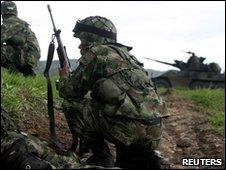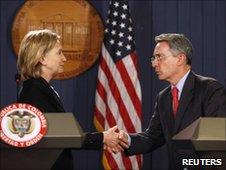What future for US-backed Plan Colombia?
- Published

Colombia's civil conflict and drugs fight have long been entangled
As Colombia prepares for the second round of its presidential election on 20 June, the BBC's Will Grant examines the impact the US-backed Plan Colombia has had on the country's battle against drug cartels and how much of a role it will have after the election.
The voices on the crackly phone line are talking in code.
"The tourist is on the bus," says the caller to the man at the other end. "Bacano" he replies, Colombian slang for "cool".
The "tourist" in question was a consignment of several kilogrammes of heroin; the "bus" a flight to Europe.
What the drug contact on the phone didn't realise was that he wasn't talking to a "mule", but an undercover anti-narcotics officer. He was arrested within hours.
Another small victory perhaps, for the outgoing government of President Alvaro Uribe in its seemingly endless battle against the cartels and the left-wing rebel group the Farc - whose main income is from the drugs trade.
It is a battle the government says it has been winning in recent years - and one which has been heavily funded by the United States through its controversial military aid programme, Plan Colombia.
"Colombia has shown the greatest reduction in coca cultivations in a decade," said the director of the national police, Gen Oscar Naranjo.

Police are constantly searching for ways to tackle the drug problem
"According to the UN's preliminary report, there are 68,000 hectares [9680sq km] under coca cultivation in Colombia this year.
"Thanks to Plan Colombia and our national security police [forces], that's a little less than a third of what it was in 1999, 1998 and 1997."
But critics disagree and have said that any reduction in the production of cocaine has been temporary at best, and that Plan Colombia has only served to push the problem beyond Colombia's borders.
Dr Arlene Tickner of the University of the Andes in Bogota is one such critic.
She said: "As a drug policy, I think Plan Colombia has been a relative failure.
"If we look at the Andean region as a whole what we see is not only that coca crops are basically the same size as the year 2000 but also that the potential cocaine production from those crops is the same as well.
"There does now seem to be a slow recognition in Washington that it's time to change tack."
"Plan Colombia was never engraved in stone," responded the US Ambassador to Colombia, William Brownfield, when asked whether Plan Colombia would remain a central part of US anti-drug policy in Latin America.
Having seen around $7bn of taxpayers' money invested in military hardware and anti-drug operations in Colombia since 1999, the Democratic majority in the US Congress and the Obama administration are said to want to reduce the military aid, and shift the emphasis to socio-economic assistance.
Mr Brownfield said: "In 1998, we had expected to start with a lot of money and see it gradually reduce over time; and that has happened.
"We had hoped to see a country that first dealt with its security and drug problems, and would then tackle its social development problems. And that has also happened.
"We may have got here pretty erratically and with some bumps in the road, I won't deny that. But the truth is I think we're pretty much where we wanted to be when we set out on the path to Plan Colombia a decade ago."
But human rights NGOs in Colombia say some of those "bumps in the road" the ambassador has referred to have involved serious war crimes by the Colombian military.
Most notable has been the so-called "false positives" scandal in which members of the Colombian military seemingly murdered innocent victims from poor neighbourhoods in Bogota and dressed their bodies up as left-wing guerrillas to claim greater victories in the war on drugs.
'Drastic action'
The leading candidate in the race for the presidency is the country's former defence minister, Juan Manuel Santos.
When asked, he brushed off uncomfortable questions about the "false positives" scandal saying his reaction to the issue was a further reason for the Colombian people to back his bid for president.

President Uribe has been Washington's staunchest ally in the region
"We didn't invent the false positives problems, I eliminated them.
"We took very dramatic action, with total determination and transparency. And with total efficiency because - since November 2008 since I acted against those involved - the reports of 'false positives' has diminished dramatically."
US Secretary of State Hillary Clinton was in Colombia this week, where she held talks with President Alvaro Uribe and Mr Santos, who many believe is the Pentagon's favoured candidate because of his promise to continue the current national security policies.
But Mrs Clinton also met the Green Party's candidate, Antanas Mockus, who is hoping to cause an upset in the second round.
"Plan Colombia has had some changes," Mr Mockus said recently. "The change in President Obama's policy goes in the same direction [as mine]...It's more about prosecuting big players in the drugs trade, and from my side, working more closely with small coca producers."
Whoever wins, Mrs Clinton assured Colombians that the security relationship with Washington would remain untouched.
"Obama has a lesser interest in Colombia than his predecessor, but the bilateral relationship has now become so institutionalised that even a new president in the United States would have a very hard time undoing it," said Dr Tickner.
- Published10 June 2010